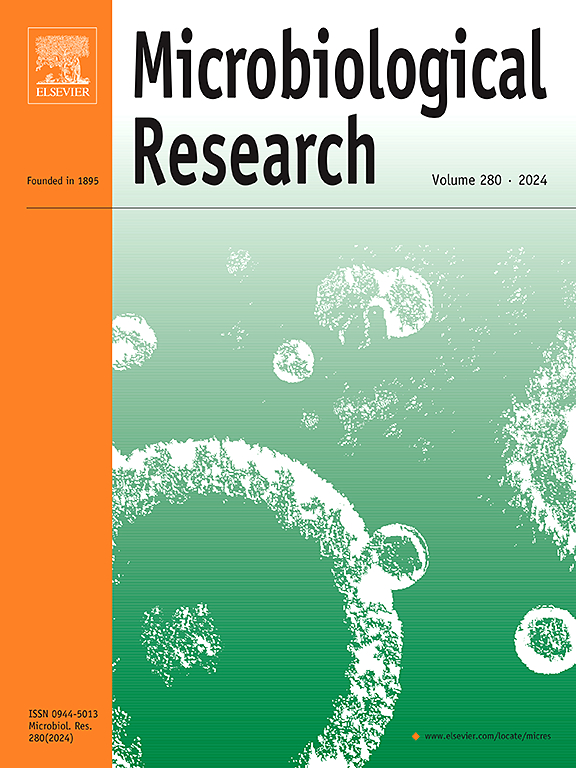Sleep deprivation accelerates Parkinson's disease via modulating gut microbiota associated microglial activation and oxidative stress
IF 6.1
1区 生物学
Q1 MICROBIOLOGY
引用次数: 0
Abstract
The interplay between Parkinson’s disease (PD) and sleep disturbances suggests that sleep problems constitute a risk factor for PD progression, but the underlying mechanisms remain unclear. Microglial activation and oxidative stress are considered to play an important role in the pathogenesis of aging and neurodegenerative diseases. We hypothesized that sleep deprivation (SD) could exacerbate PD progression via modulating microglial activation and oxidative stress. To test this hypothesis, we established a PD mouse model using 1-methyl-4-phenyl-1,2,3,6-tetrahydropyridine (MPTP), then subjected the mice to SD. A battery of behavioral tests, including rotarod, pole, adhesive removal, and open field tests, were used to assess motor function. Our study showed that SD exacerbated motor deficits, loss of tyrosine hydroxylase (TH), microglial activation and oxidative stress damage in PD model mice. Fecal microbiota transplantation experiments revealed that SD mediated PD progression, microglial activation and oxidative stress via the gut microbiota. 16S rRNA sequencing analysis indicated that SD increased the abundances of bacteria such as Bacteroidaceae, while decreasing the abundances of bacteria including Lactobacillus. Non-targeted metabolomic analysis of gut microbiota-derived metabolites revealed that SD significantly increased the production of adenosine (ADO), a purine metabolite. Probiotic supplementation reversed the effects of SD on motor deficits, dopaminergic neuron loss, microglial activation and oxidative stress damage in PD mice; it also decreased SD-induced ADO production. Administration of Adenosine A2A receptor (A2AR) inhibitors, Istradefylline (Ist), attenuated the roles of SD and ADO in promoting microglial activation, oxidative stress and PD progression. Taken together, our findings indicate that SD accelerates PD progression via regulating microbiota associated microglial activation and oxidative stress, suggesting that efforts to improve sleep quality can be used to prevent and treat PD.
睡眠剥夺通过调节肠道微生物群相关的小胶质细胞激活和氧化应激加速帕金森病。
帕金森病(PD)与睡眠障碍之间的相互作用表明,睡眠问题是帕金森病进展的一个危险因素,但其潜在机制尚不清楚。小胶质细胞活化和氧化应激被认为在衰老和神经退行性疾病的发病机制中起重要作用。我们假设睡眠剥夺(SD)可以通过调节小胶质细胞激活和氧化应激来加剧PD的进展。为了验证这一假设,我们用1-甲基-4-苯基-1,2,3,6-四氢吡啶(MPTP)建立了PD小鼠模型,然后对小鼠进行SD治疗。一系列的行为测试,包括旋转棒、杆子、去除粘合剂和开阔场地测试,用于评估运动功能。我们的研究表明,SD加重了PD模型小鼠的运动缺陷、酪氨酸羟化酶(TH)丧失、小胶质细胞活化和氧化应激损伤。粪便菌群移植实验表明,SD通过肠道菌群介导PD进展、小胶质细胞激活和氧化应激。16S rRNA测序分析表明,SD增加了拟杆菌科等细菌的丰度,降低了乳杆菌等细菌的丰度。肠道微生物衍生代谢物的非靶向代谢组学分析显示,SD显著增加了嘌呤代谢物腺苷(ADO)的产生。补充益生菌可逆转SD对PD小鼠运动缺陷、多巴胺能神经元丧失、小胶质细胞激活和氧化应激损伤的影响;它还减少了sd诱导的ADO生成。腺苷A2A受体(A2AR)抑制剂iststradefylline (Ist)可减弱SD和ADO在促进小胶质细胞活化、氧化应激和PD进展中的作用。综上所述,我们的研究结果表明,SD通过调节微生物群相关的小胶质细胞激活和氧化应激来加速PD的进展,这表明改善睡眠质量可以用来预防和治疗PD。
本文章由计算机程序翻译,如有差异,请以英文原文为准。
求助全文
约1分钟内获得全文
求助全文
来源期刊

Microbiological research
生物-微生物学
CiteScore
10.90
自引率
6.00%
发文量
249
审稿时长
29 days
期刊介绍:
Microbiological Research is devoted to publishing reports on prokaryotic and eukaryotic microorganisms such as yeasts, fungi, bacteria, archaea, and protozoa. Research on interactions between pathogenic microorganisms and their environment or hosts are also covered.
 求助内容:
求助内容: 应助结果提醒方式:
应助结果提醒方式:


